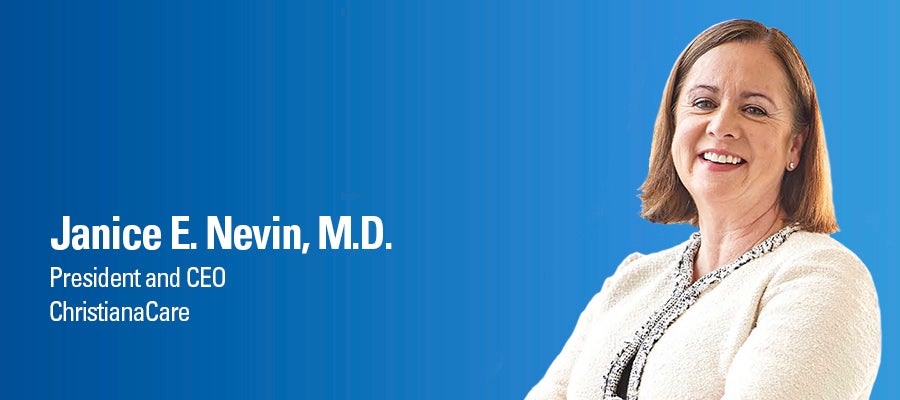Delaware's Commitment to Advancing Health Equity: One Hospital at a Time

All acute care hospitals in Delaware have agreed to embark on a journey to eliminate health disparities and create healthier communities. Janice E. Nevin, M.D., president and chief executive officer of ChristianaCare, helped make this statewide commitment possible. Last year, the Institute for Diversity and Health Equity (IFDHE) launched the Health Equity Roadmap, a national initiative to drive improvement in health care outcomes, health equity, diversity and inclusion. The Roadmap helps hospitals and health systems chart their own path toward transformation.
As a member of the AHA Board of Trustees, Dr. Nevin encouraged the leaders of other health care providers in Delaware to take the Health Equity Transformation Assessment (HETA). Dr. Nevin shared why she believes this work is so vital.
What motivated you to get all of Delaware’s acute care hospitals to take the HETA, and why do you think health equity is an important issue right now?
As a leader, I’ve been committed to health equity throughout my career. And, as an organization, ChristianaCare has a long-standing commitment to advancing health equity because when you lead with love, excellence is inevitable and equity is achievable. It is critically important that health care institutions come together to end health disparities. If we do not eliminate long-standing disparities, we will not achieve the outcomes we desire in clinical care and in quality and safety nor improve the health of the communities we serve. Eliminating health disparities is essential to our success in population health and value-based payment models. In recent years the medical community has embraced the idea of “Zero Harm,” and I believe we need to do the same with “Zero Disparities.” Delaware’s size offers the opportunity to do this work collectively across the entire state. We've all got to be in this together if we are truly going to make a difference. The Health Equity Roadmap provides leaders a tool to be able to understand exactly where their systems are on the journey toward equity. It allows them to identify places for investment, improvement and impact.
What was your strategy to get the other systems to take the HETA, and were there any challenges you encountered?
The AHA did a great job at last year’s annual summit in engaging attendees in a conversation about health equity. As an AHA board member, I had agreed to take the HETA. But I kept thinking it would be great to involve all my fellow CEOs in Delaware. I received immediate agreement from the ones who were also at the summit when I approached them. I brought it to the next Delaware Healthcare Association Board and received unanimous support there, too.
Are there any health equity issues or topics that you think Delaware should have more efforts or resources allocated to?
ChristianaCare has a powerful partnership with a company called UniteUs. Together, we developed Unite Delaware. It’s a closed-loop referral system that connects a network of approximately 250 community-based organizations, addressing a variety of social needs across the state. That number continues to grow. Social determinants of health are responsible for as much as 50% of health outcomes. As health care providers we must be involved in improving our patients’ social determinants of health. But we cannot and should not try to be all things to all people. That is where Unite Delaware comes in and helps us meet more of the needs of the people we serve. I think there's a real opportunity for state government and other health systems to embrace this approach. The more key stakeholders we have involved, the more other organizations will be inspired to join and help create an even more robust network.
How do you think the Health Equity Roadmap can help address or improve those issues?
The Health Equity Road map is a new resource in our toolbox, which, frankly, hasn't had many tools in it. It implores health systems to begin the work of addressing health equity by looking in the mirror. They may be making an incorrect assumption or applying resources in an ineffective way. Being honest about where they are allows for growth, development and transformation. At ChristianaCare, we’re taking a very data-guided approach to identify where disparities exist and develop effective solutions to address them. I would encourage any health system that has not signed on yet to do so.
What is your commitment to improving health outcomes? How does ChristianaCare address health equity?
In 2020, ChristianaCare made a public commitment to be an anti-racist organization. That means embracing a goal of zero disparities and doing what is needed both inside and outside the four walls of our hospitals and offices to make that happen. We are committed to addressing the social drivers of health. Unite Delaware is an essential part of that. And we also have our own programs around eating healthy, reducing gun violence and more. We have a community-based partnership around substance use disorder and a behavioral health unit embedded in a county police department. And through our multi-million-dollar Community Investment Fund, we are directly investing in impactful community-based organizations – many of which are part of Unite Delaware.
